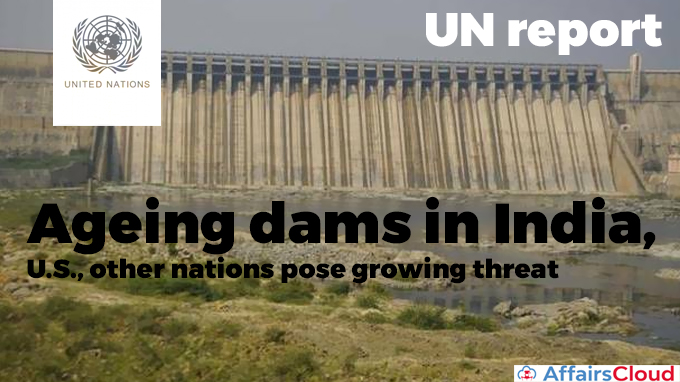 United Nations University – Institute for Water, Environment & Health (UNU-INWEH) released a report called ‘Ageing Water Storage Infrastructure: An Emerging Global Risk’, the report states that ageing of large dams is an emerging Global Development issue as they pose threats to human safety & environment.
United Nations University – Institute for Water, Environment & Health (UNU-INWEH) released a report called ‘Ageing Water Storage Infrastructure: An Emerging Global Risk’, the report states that ageing of large dams is an emerging Global Development issue as they pose threats to human safety & environment.
- Globally, around 10,000 more dams have reached or exceeded the ‘alert’ age limit of 50 years & many dams are expected to approach 100 years soon.
- Around 32, 716 large dams (55% of World) are situated in only 4 Asian Countries – China, India, Japan & South Korea, majority of these dams are set to reach the limit of 50-year threshold.
- In India, around 1, 115 large dams are set to reach the ~50 years mark by 2025.
- The report consists of case studies on decommissioning & ageing of dams from the United States, France, Canada, India, Japan, and Zambia & Zimbabwe.
- Duminda Perera, Vladimir Smakhtin, Spencer Williams, Taylor North, Allen Curry were the authors of the report.
i.Synopsis:
- It is a summary of the present state of knowledge on the ageing of large dams in the world.
- It is originally intended for Governments and agencies which are responsible for planning, managing & implementing water infrastructure developments.
ii.Report about Global Dams:
- About 93% of World’s largest dams are located in 25 nations.
- The construction of large dams has been declining steadily in the last 40 years.
- Reasons causing Dam Decommissioning across the world are public safety, rising maintenance costs, reservoir sedimentation & restoration of the natural river ecosystem.
- Average life expectancy of a dam is around 50 years
- Some sources indicate that an average life expectancy of a dam is 50 years
iii.Regarding India
- In India, around 4, 250 large dams will be more than 50-years old in 2050 & 64 large dams will be more than 150-years old in 2050.
- The report also states that India’s current dam construction rate is one of the world’s highest.
Case study on Kerala’s Mullaperiyar Dam:
The Mullaperiyar dam was built on the river of Periyar in 1895.
- The dam is situated in a seismically active area (prone to earthquakes) and is showing signs of failure & is facing the risk of failure.
- If at all, any failure occurs in the dam around 3.5 million people will be affected by it.
Click here to read the full report
About United Nations University – Institute for Water, Environment & Health (UNU-INWEH):
INWEH is one of the United Nations University (UNU) institutes, an academic arm of the UN.
Director – Vladimir Smakhtin
Location – Hamilton, Canada
AffairsCloud Recommends Oliveboard Mock Test
AffairsCloud Ebook - Support Us to Grow
Govt Jobs by Category
Bank Jobs Notification




